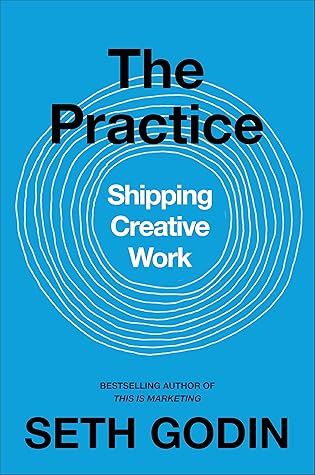More on this book
Community
Kindle Notes & Highlights
if we don’t need confidence, if we can merely trust the practice and engage in the process of creation and shipping, then resistance loses much of its power.
Generosity subverts resistance by focusing the work on someone else.
giving in to resistance when you’re doing generous work feels selfish.
For art to be generous it must change the recipient.
If it doesn’t, it’s not working (yet). But realizing it’s not working is an opportunity to make it better.
The practice is agnostic about ...
This highlight has been truncated due to consecutive passage length restrictions.
The magic is that you chose to share it.
“It’s not working (yet).” That’s the only reassurance you truly need.
There’s a practice. The practice is proven, and you’ve embraced it.
Now, all that’s neede...
This highlight has been truncated due to consecutive passage length restrictions.
More time, more cycles, more bravery,...
This highlight has been truncated due to consecutive passage length restrictions.
Positive people are more likely to enjoy the practice.
They’re not wasting any time experiencing failure in advance.
If we can model being positive about our practice, the outcome will take care of itself.
you ship generous work and it doesn’t connect with the desired audience, you may have had an outcome you didn’t hope for, but the practice itself isn’t a failure.
if you have a practice, failure
is part of it.
It’s impossible to be appropriately generous to everyone.
We have to be able to say “it’s not for you” and mean it.
Part of the work involves leaving the safety of our own perfectly correct narrative and intentionally entering someone else’s.
the only way to engage with this gap is to go where they are, because those you serve are unlikely to care enough to come to you.
you don’t create a hit by trying to please everyone.
A key component of practical empathy is a commitment to not be empathic to everyone.
That’s okay, because the work isn’t for them.
“It’s not for you” is the unspoken possible companion to “Here, I made this.”
That leaves the option of trusting your self. This combines two choices:
Choose to make work that matters a great deal to someone.
Choose to commit to the journey, not to any particular engagement.
Great work isn’t popular work; it’s simply work that was worth doing.
If there are only non-believers, the reason is simple: you’re not seeing genre the way others do.
it’s not as good as you think it is—if
To embrace the fact that the audience isn’t wrong, you’re just not right (yet).
Their failure was in setting expectations for a mass audience. They built an organization that promised to change the world overnight and brought their ideas to the wrong audience
Audience and reality out of sync. Made a mass market product but no mass market materialized. Generous, but for the wrong audience. Not a failure, just not the expected outcome
quality means meeting spec.
the more vernacular understanding of quality means luxury.
the quality of creative magic.
Being accepted and admired by your specific audience is another sort of good—and for most of us, this is actually enough. I believe this is the goal of a working creative.
Selling is simply a dance with possibility and empathy. It requires you to see the audience you’ve chosen to serve, then to bring them what they need.
Sales is about upending the status quo of what the world was like before you got there.
for the people who will benefit from the change you created.
Enrollment is acknowledgment that we’re on a journey together.
Our desire to please the masses interferes with our need to make something that matters.
The practice demands that we seek to make an impact on someone, not on everyone.
We can spend a lot of psychic energy willing the weather to be perfect.
The thoughtful alternative is resilience. To be okay no matter how the weather turns out, because the weather happens without regard for what we need.
When we get really attached to how others will react to our work, we stop focusing on our work and begin to focus on controlling the outcome instead.
We’re always falling. The good news is that there’s nothing to hold onto.
As soon as we stop looking for something to grab, our attention is freed up to go back to the practice,
Becoming unattached doesn’t eliminate our foundation. It gives us one.


